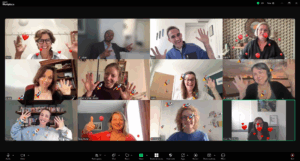Transforming Workplace Culture: How ORSC Training Can Tackle Toxicity
Workplace culture plays a pivotal role in the success of any organisation. A healthy, positive culture fosters innovation, engagement, and high performance. However, when toxicity seeps in, it can erode the very foundation of an organisation. In many cases, toxic workplace culture is linked to the behaviour of managers who fail to rein in these negative dynamics. In this blog post, we’ll explore the risks of managers allowing toxic behaviour to thrive and how Organisation and Relationship Systems Coaching (ORSC) training offers a powerful antidote.
The Anatomy of Toxic Workplace Culture:
Toxic workplace cultures are characterised by behaviours such as bullying, harassment, gossip, favouritism, and a lack of transparency. These behaviours can have dire consequences:
1. Employee Burnout:
Toxic cultures contribute to high levels of stress and burnout. Employees are constantly on edge, leading to decreased job satisfaction and productivity.
2. High Turnover:
A negative environment drives away top talent. Organisations with high employee turnover face recruitment and training costs, reduced productivity, and a tarnished reputation.
3. Diminished Innovation:
In a culture that suppresses creativity and open communication, innovative ideas are stifled, impacting the organisation’s long-term growth.
4. Erosion of Trust:
Toxic cultures erode trust between employees and management. When trust is broken, collaboration and productivity suffer.
5. Legal and Reputational Risks:
Incidents of harassment or discrimination can lead to costly legal battles and tarnished public image.
The Role of Managers in Fostering Toxicity:
Managers are often the linchpin in shaping workplace culture. When they fail to address or, worse, perpetuate toxic behaviour, the entire organisation suffers. This failure can stem from a lack of awareness, skills, or support to handle these issues effectively.
How ORSC Training Can Help:
Organisation and Relationship Systems Coaching (ORSC) is a powerful tool in transforming toxic workplace cultures. Here’s how:
1. Building Stronger Relationships:
ORSC emphasises the importance of healthy, collaborative relationships within an organisation. Managers trained in ORSC gain the skills to build stronger, more positive relationships with their teams. They learn to listen actively, communicate effectively, and resolve conflicts constructively.
2. Shifting Mindsets:
ORSC training encourages a systemic perspective, helping managers recognise how their actions impact the entire organisation. This shift in mindset can prevent toxic behaviours from taking root.
3. Conflict Resolution:
Managers often shy away from addressing conflicts, fearing escalation. ORSC equips them with conflict resolution techniques that enable them to address issues promptly and professionally, preventing them from fester.
4. Developing Emotional Intelligence:
ORSC incorporates emotional intelligence, a crucial skill for any manager. It helps them recognize and manage their emotions while understanding and responding to the emotions of others. This emotional intelligence is key to handling difficult situations with empathy and sensitivity.
5. Creating a Shared Vision:
ORSC training teaches managers how to create a shared vision and align their teams with organisational goals. When employees see a clear purpose and path forward, it can deter negativity and encourage collaboration.
Toxic workplace cultures can have a devastating impact on organisations, but managers trained in ORSC can be catalysts for change. By fostering healthier relationships, resolving conflicts, and embracing a systemic perspective, ORSC equips managers to combat toxic behaviour effectively. Ultimately, ORSC training offers a path to transform a toxic workplace culture into a thriving, positive one where employees feel valued, engaged, and motivated.
ORSC is not just about addressing symptoms; it’s about creating lasting, systemic change in the way an organisation functions, and that is a powerful tool in tackling toxic workplace culture.






